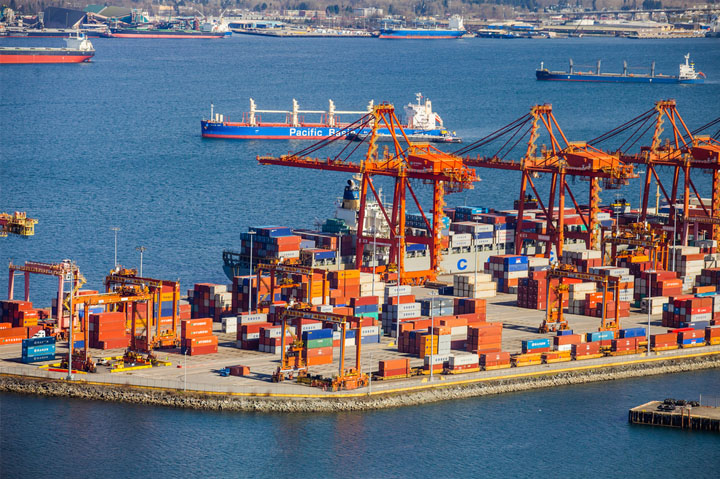CANADIAN NEWS July 05, 2023
Port Workers Strike on Canada’s West Coast
Goods haven’t moved from ships since last Friday. A long-term stoppage could have a significant impact on the industry.
A major port worker strike on the West Coast of Canada is already stranding billions of dollars’ worth of trade offshore, and it has promotional products firms concerned about the effects of long-term disruption.
On July 1, members of the International Longshore & Warehouse Union (ILWU) in Canada officially went on strike, resulting in more than 7,000 workers walking off the job at over 30 ports, including Vancouver (the country’s largest port) and Prince Rupert. Now, nearly 290,000 containers are at anchor and can’t be unloaded – experts estimate there’s nearly $20 billion worth of product that’s hasn’t moved since June 30.

Container port terminal in Vancouver, BC. Workers at more than 30 ports on the West Coast of Canada, including Vancouver, walked off the job on July 1.
The British Columbia Maritime Employers Association (BCMEA), which represents 67 member companies with commercial interests at waterfronts on Canada’s West Coast, is still in negotiations with the ILWU, though talks have been temporarily paused as federal mediators are consulted.
The largest disagreements between the two parties center on contractors hired for maintenance work at the ports and wages. ILWU wants an increase of 11% in the first year, an increase of 6% in the second year and a one-time $8,000 signing bonus to account for inflation and the rising cost of living in Canada.
ILWU President Rob Ashton says employers’ high profits in recent years should be shared with union members. “[It’s] reasonable for the workers that helped to achieve those record profits in the first place to have a fair and equitable share of them,” he says, adding that the BCMEA has not heeded the union’s concerns.
Officials are concerned about both imports and exports, including steelmaking coal, copper concentrates and potash that head across the Pacific via Vancouver. Mining Association of Canada President Pierre Gratton told Bloomberg that a strike that lasts longer than a week will have a significant impact on the Canadian economy. The Canadian Chamber of Commerce has called for Parliament to return from summer recess to pass back-to-work legislation that would order an end to the strike and a settlement between the parties.
The situation is of mounting concern to businesses across Canada, including promo firms. Sergio Munoz, vice president of business development for Concord, ON-based Debco, part of Top 40 supplier HPG (asi/61966), says Vancouver and Prince Rupert are the primary ports for Debco’s product arrivals from Asia. In anticipation of a possible strike, the supplier expedited the unloading of several containers, a move that Munoz hopes will mitigate order interruptions for the time being.
“A long-term strike on the West Coast could have far-reaching implications for our industry,” Munoz says. “Delays in product delivery could potentially disrupt our ability to meet client demands and fulfill orders on time. It could lead to a chain reaction of logistical challenges, which would affect the entire industry.”
Munoz adds that Debco is continuing to monitor the situation and is communicating with suppliers and shipping partners to develop contingency plans, such as using other ports and/or air freight.
Ron de Moor, co-founder and president of DML Creation (asi/48031) in St. Jerome, QC, says they’ve already had to reroute a couple POs through Halifax, NS, instead of Vancouver. It added three weeks to the transit time, he says, but that’s preferable to having orders on cargo ships at anchor with no timeline as to when they’ll be unloaded.
“No one wins in these scenarios except the other ports that are willing to accept diverted shipments. Workers and businesses all lose out, especially with inflation already where it is and supply chains still recovering.” Sam Singh, Full Line Specialties
“We also tend to bulk buy,” de Moor says, “so our inventory levels are good for the upcoming season. By doing this, our stress levels aren’t that high when situations like this arise.”
Mark Jackson, president of SwagDrop (asi/300621) in Oakville, ON, says a long-term strike will have major implications for promo companies getting ready for the busy Q4 gifting season. Fortunately, his distributorship has other port options: “Our suppliers can also use Long Beach or Tacoma,” he says. “Air freight has also come down in expense since the pandemic and is another option (although a last resort) for items with a high density – think many products in a small space, like pens, but not tumblers that have a lot of air inside them.”
So far, ports on the West Coast of the U.S. have yet to report significant delays due to rerouted ships.
The strike comes just as supply chains were continuing to improve after a tough few years during the pandemic. Vancouver in particular is a critical part of Canada’s economy; according to the port, more than $300 billion in goods moves through it each year, contributing nearly $12 billion to the country’s GDP. Sam Singh, president and CEO of Full Line Specialties (asi/199688), in Surrey, BC, says crippling disruption at the port could change that.
“No one wins in these scenarios except the other ports that are willing to accept diverted shipments,” Singh says. “Workers and businesses all lose out, especially with inflation already where it is and supply chains still recovering. It gives factories and suppliers another reason to reroute or use alternative ports, giving them a taste of what other ports can offer going forward, and that could cause Vancouver to lose future business.”
The inflation rate has gradually dropped since a high of 8.1% in July 2022 – it hit 3.4% in May compared to a year before, the lowest it’s been in two years. The Bank of Canada hiked its key interest rate to 4.75% in June, a 22-year high.
